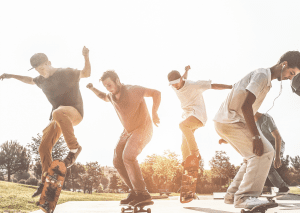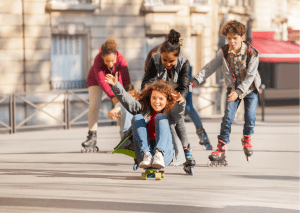Longboarding is a fun hobby and an extreme sport. It’s also an effective tool for developing mental grit & great resilience in riding a board. This perspective highlights riding as not just a physical activity but also a means to build inner strength and perseverance. In this article, it’s insightful to understand how mastering the board can help foster resilience and have a good outlook in life.

We will explore the supportive skateboard community within circles, emphasizing the role of skateboarding in creating resilience, and share inspiring stories of determination from skaters themselves.
So whether you’re a seasoned skater or have never set foot on a skateboard before, it is good to know more about the connection between creating determination and riding it.
Key Takeaways
Skateboarding can help in creating resilience for all ages. In this article, you get to know the ecosystem and how it helps in creating resilience. Skateboards, parks, and skaters all play a role in developing a strong sense of self and giving people of all ages an opportunity to grow resilient. As an extension of this, we’ve heard inspiring stories of determination that developed from skateboarding and seen how it can help people overcome challenges and keep rolling with the punches.
It’s not about being the best; it’s about having the courage to get back up after a fall and keep riding as a marginalized youth on a skateboard. So, pick up your skateboard, embrace each challenge as an opportunity for growth, and discover how skateboarding transcends mere sport, offering life lessons that many people don’t get from traditional activities. Through mastering tricks and engaging in creative expression, skateboarding fosters a sense of belonging and is instrumental in building confidence, as well as overcoming challenges with resilience.
What Is Resilience?
You’ve probably heard the term ‘resilience’ tossed around, but do you really know what it means? Resilience theory refers to our ability to bounce back from adversity. It’s about psychological determination- having the strength to overcome challenges and transform them into growth opportunities. Understanding this concept is vital in empowering us as we aim to serve others better.
It can help build this resilience and provide a valuable tool to use in our personal and professional lives. It develops determination in many ways. It teaches us how to take risks and set small goals; how to be brave and take calculated risks; and how to accept failure and use it as a learning opportunity. Additionally, it helps us learn the importance of self-care, community, and creating relationships. These skills are useful to everyone, from students to professionals, and can also be applied to other areas of life.
So, whether you’re looking to improve your resilience or just have some fun, skateboarding offers a great way to do it. People don’t often realize that skateboarding is more than just a sport; it’s a form of creative expression and a means of building confidence. It’s an excellent method for building resilience in the face of challenges and overcoming the fear of falling. It’s a great way to get outdoors, stay active, and build your confidence. Plus, it’s a great way to bond with others and learn something new. So, grab your skateboard and hit the streets – you’ll soon be reaping the rewards of your determination and life lessons learned through skateboarding!
Improving Determination & Persistence
Believe it or not, mastering the art of the skate ollie trick or nailing a skate kickflip can do wonders for your mental toughness. Many skaters believe that it builds determination in powerful and unexpected ways.
Skateboarding is more than just a sport; it is a journey that teaches patience, perseverance, adaptability, emotional strength, self-discipline, and practice. Over the years, this journey has been based on the evolution of the skateboard design, including the latest trends, the injury recovery process, and the continual exposure to failure and success. Many skaters have shared stories of practicing tricks at home after school, dedicating time to refining their skills, emphasizing the dedication required for this sport.

It is a part of the larger ‘board sports’ class, which includes snowboarding, surfing, and wakeboarding. Each of these sports has its unique attributes and values, such as extreme sports, physical fitness, and personal growth. As each of these sports is rooted in the same culture, their shared values also include pushing boundaries, camaraderie, and individual expression.
These qualities that bring to the table are not just for the skateboard, but they extend to everyday life. The drive to continually learn a new trick, facing new obstacles, and pushing the boundaries of what’s possible all require a certain mindset.
The Role Of Mindset
Riding a skateboard is more than just a physical activity; it’s a tool for developing resilience. It’s the mindset—the drive to keep pushing past every fall and failure—that sets it apart. Skateboarding offers numerous life lessons, teaching confidence and resilience that extend beyond the sport itself.
Skateboarding psychology is about more than just mastering tricks; it’s about training your mindset and embracing challenges, adapting to change, and bouncing back from setbacks. Skateboarding is more than just a sport; it’s a journey that teaches marginalized youth and all youth, patience, perseverance, adaptability, emotional strength, self-discipline, and practice. But it’s not just about the individual; the skateboard community plays a vital role in encouraging and supporting each other.
We understand that skateboarding is a multifaceted activity involving a range of components such as skateboard decks, trucks, wheels, bearings, and clothing. Each item contributes to the experience, but it’s the attitude—their mindset—that is at the core of the experience. By cultivating an attitude of determination and discipline, they can achieve the best results and develop their unique style. Despite the challenges, people don’t easily give up because of the profound life lessons skateboarding imparts.
Skateboarding Community
Are you ready to experience the thrill of skateboarding as part of an amazing skateboarding community? Many know that skateboarding is much more than just tricks and flips; it’s a way to connect with others and have a positive cultural impact on the culture. Respect for park etiquette and a willingness to share experiences are the foundations of riding a skateboard as a sport. Embracing diversity and determination, it recognizes that race and skateboarding are intertwined, emphasizing the inclusivity of the sport.
As you discover the true essence of being part of this unique group, you’ll learn how to build determination together through shared skate experiences. Skateboarding transcends age and background, fostering a sense of community among marginalized youth and all young people from diverse backgrounds. Skateboarding offers more than just physical activity; it provides life lessons in resilience and fostering a sense perseverance. It has a powerful impact on the family unit as it creates connections and encourages healthy habits.
It also helps promote physical activity, creativity, and coordination in overcoming challenges. With its growing popularity, there has been an increase in parks, companies, and accessories. People don’t just skate for fun; they skate to find a sense of belonging and to build resilience in the face of challenges. It has become a way of life for many and continues to be an important part of the culture.
Stories Of Strength
Diving right into the heart of the skateboarding community, we’ve got countless tales of resilience that paint a vivid picture of how skaters bounce back from setbacks. From injuries to skateboarding triumphs, each story is a testament to their unwavering spirit and how skateboarding improves mental health.
Their injury recovery journeys inspire us all and prove that even the most difficult of obstacles can be used as a springboard for growth. This sport fosters a tight-knit skateboarding community and encourages everyone to develop the ability to overcome challenges.
There are different stories of determination in riding a skateboard and discovering how to make the most of every setback. Through these experiences, skaters develop essential life skills, many of which are directly obtained through this sport.
Some Practical Tips
Skateboarding is an incredible way to build resilience and cultivate a tenacious spirit. Many knew the invaluable lessons that can come from this incredible sport. To help you on your journey, this article put together some practical tips for building resilience through skateboarding.

- Firstly, don’t be afraid of skateboarding injuries. They can be a great learning opportunity and a chance to get stronger.
- Secondly, stay committed even when it’s tough. Consistent practice and discipline are key.
- Thirdly, don’t give up. Progress comes in small steps.
- Finally, share your skills and inspire resilience in others.
The skateboard is truly a unique tool for having resilience. Whether it’s learning how to recover from falls and setbacks or developing the discipline to keep going, skateboarding has the power to help us become more resilient. If you’re looking for guidance on your own journey, then you need to improve your mindset and be good at preparation.
Conclusion
We’ve explored how riding a skateboard creates determination and the mindset required. We’ve also seen the community aspect of skateboarding. Skateboards, parks, and skateboarders are all part of the sport ecosystem, and each plays a role in helping create resilience. Skateboarding is fun and enjoyable, and it is for everyone.
We’ve heard inspiring stories of determination within this sport and seen how riding a skateboard can help people of all ages develop a strong sense of self. Remember, it’s not about being the best; it’s about getting back up after a fall and continuing to skate. So grab your skateboard, embrace each moment as an opportunity to grow stronger, and keep rolling with the punches!
In the time spent learning to skate, you will find a connection that brings hope and support to your journey. Events and gatherings allow you to connect with other individuals, kids, and adults alike, who share the same passion. Skateboarding can change lives by providing a space for passion for skateboarding, where individuals work on skills, build connections, and come together as a community. Stay open to new experiences, and let each challenge sign you up for a stronger, more resilient self. Keep working hard and never lose hope!
Frequently Asked Questions
What Are The Long-term Effects Of Riding A Board?
Long-term effects of skateboarding, such an integral part of youth culture today, include improved balance, coordination, and endurance. However, without proper gear and training, the potential for chronic injuries remains a concern. Skateboarding stands as a significant part of education in children’s lives, offering life lessons of building confidence and resilience, overcoming the fear of failure, and creative expression. Ultimately, skateboarding offers hope and a new world of opportunities.
What Is Important In Riding A Board?
Mastering balance, learning different tricks and techniques, and practicing safety precautions are key aspects of skateboarding. Skateboarding offers not only a physical challenge but also a sense of belonging within the community. Respect for the culture, a crucial part of youth culture, is essential among young people engaged in the sport, teaching them valuable life lessons and responsibility. The sound of wheels on pavement becomes a familiar tune, and as people don’t often realize, mastering tricks helps build resilience in the face of challenges and setbacks.
Does Riding A Board Help With Other Sports?
Skateboarding helps develop balance, agility, and coordination – skills that are beneficial for many other sports. Skateboarding stands out not only as a sport but also as a form of creative expression, allowing individuals to showcase their unique styles and tricks. It can also improve physical fitness, which contributes to overall athletic performance, building confidence and resilience in the process. The sport fosters diversity and determination among its practitioners, as skateboarding transcends traditional athletic boundaries. The sound of wheels rolling on the pavement becomes a testament to the passion for skateboarding confidence and resilience skaters build through their practice.
Why Is Riding A Board The Best Sport?
Opinions vary, but others say skateboarding is the best sport due to its blend of athleticism, creativity, and individual expression. It’s also accessible and can be practiced in many environments.
Why Do People Love To Ride A Board?
People love it for various reasons, from the joy of movement and the challenge of learning new tricks to creating relationships within the vibrant culture. It also offers a unique form of self-expression and freedom, drawing in young people who often become excellent critical thinkers, regardless of their race matter. This study aims to underscore these benefits and the overall positive impact of skating on youth culture and mental health.
What Are The Benefits Of This Sport?
They typically enjoy benefits such as increased physical fitness, improved coordination, and enhanced mental determination – all valuable skills obtained through the activity. Additionally, the skateboard community fosters social connections and encourages diversity, welcoming members from diverse backgrounds. Skateboarding in parks helps to empower children and have a spirit of team sports.
How Do You Feel When You Ride A Board?
Many people report feeling a sense of freedom, exhilaration, and accomplishment when they skateboard. From a more communal perspective, it has been found to improve mental health, offering a moment of relief from stress in a supportive environment.
How Does Skateboarding Affect The Brain?
Riding a skateboard can enhance coordination and spatial awareness, both of which engage various parts of the brain. Additionally, the physical activity and skill mastery associated with this sport improve mental health, fostering determination and intercultural communication among skaters.
Why Is Skateboarding Different From Other Sports?
It is different from other sports due to its blend of athleticism, creativity, self-expression, and diverse culture. It’s not just about competition but also about personal style, progression, and forming an identity in society.
Is Skateboarding An Endurance Sport?
While it requires a degree of stamina, it’s not typically classified as an endurance sport like running or cycling. Instead, it involves more burst-type, high-intensity movements, and balance skills, highlighting connections between physical fitness and mental acuity.
DISCLAIMER (IMPORTANT): This information (including all text, images, audio, or other formats on FamilyHype.com) is not intended to be a substitute for informed professional advice, diagnosis, endorsement or treatment. You should not take any action or avoid taking action without consulting a qualified professional. Always seek the advice of your physician or other qualified health provider with any questions about medical conditions. Do not disregard professional medical advice or delay seeking advice or treatment because of something you have read here a FamilyHype.com.